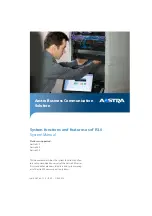
Setting Up the V3 Paging Server
Configure the Autoprovisioning Parameters
CyberData Corporation
930427L
Operations Guide
65
XML Files
XML files can contain <AutoprovFile>
elements. If multiple DHCP options are specified, the device
will try to download autoprovisioning files from each in turn. The device will only look for
<AutoprovFile> elements in the first file downloaded from each server. You can specify up to 20
<AutoprovFile> elements in the first autoprovisioning file.
There are numerous ways to change an element of the
configuration(xml)
file. Using
sip ext
as an
example, the extension can be changed:
Within the device-specific xml, i.e.
[macaddress].xml
, via the AutoprovFile
element:<SIPSettings>/<SIPExt>
From the device specific xml, a pointer to a sip_common file
From the device specific xml, a pointer to the device specific sip_[macaddress].xml
From the common file, a pointer to sip_common.xml
From the common file, a pointer to the device specific (sip_[macaddress].xml)
Autoprovisioned
Audio Files
Audio files are stored in non-volatile memory and an autoprovisioned audio file will only have to be
downloaded once for each device. Loading many audio files to the device from the web page could
cause it to appear unresponsive. If this happens, wait until the transfer is complete and then refresh
the page.
The device uses the file name to determine when to download a new audio file. This means that if
you used autoprovisioning to upload a file and then changed the contents of this file at the TFTP
server, the device will not recognize that the file has changed (because the file name is the same).
Since audio files are stored in non-volatile memory, if autoprovisioning is disabled after they have
been loaded to the board, the audio file settings will not change. You can force a change to the audio
files on the board by clicking
Restore Default
on the
Audio Configuration
page
or by changing the
autoprovisioning file with “
default
” set as the file name.
















































